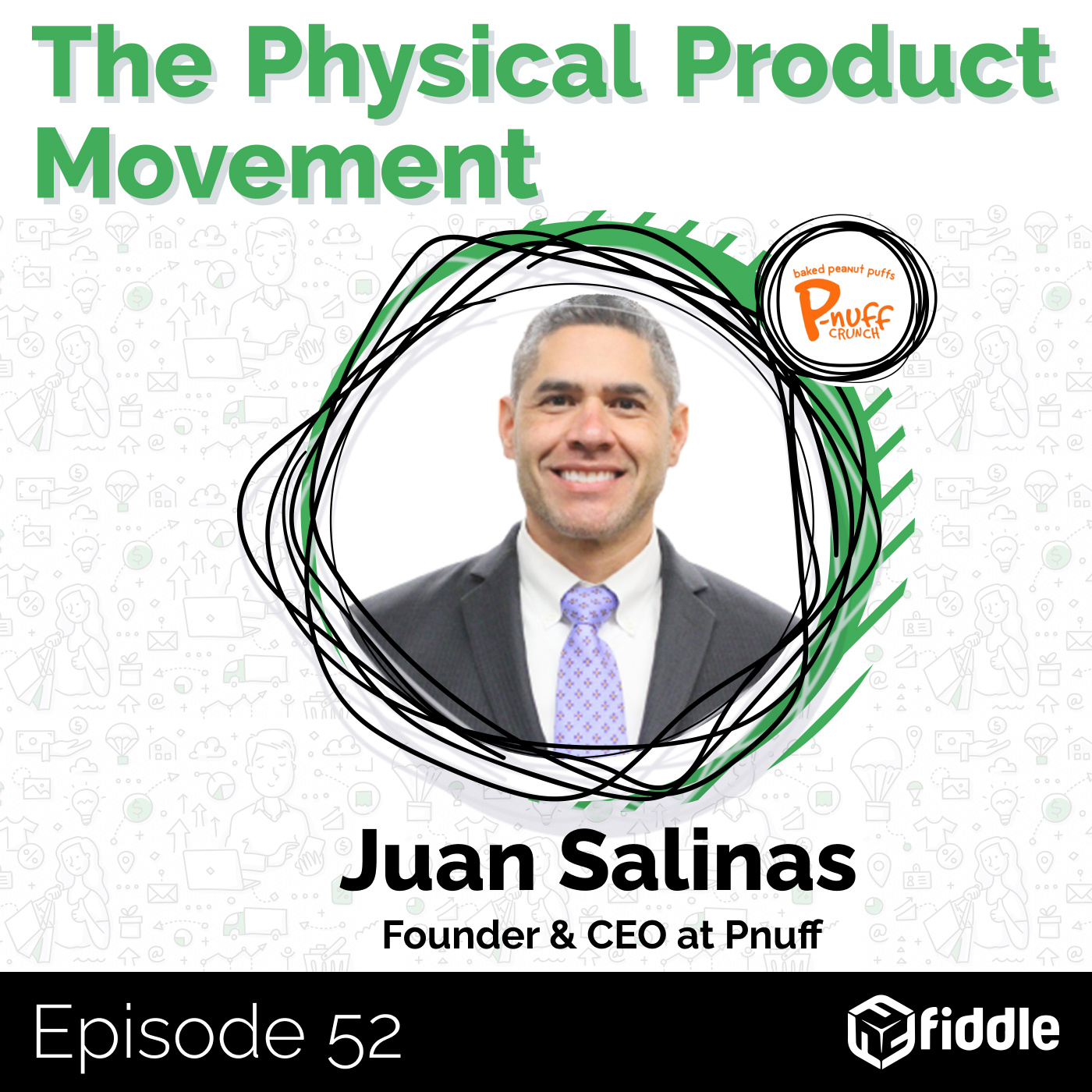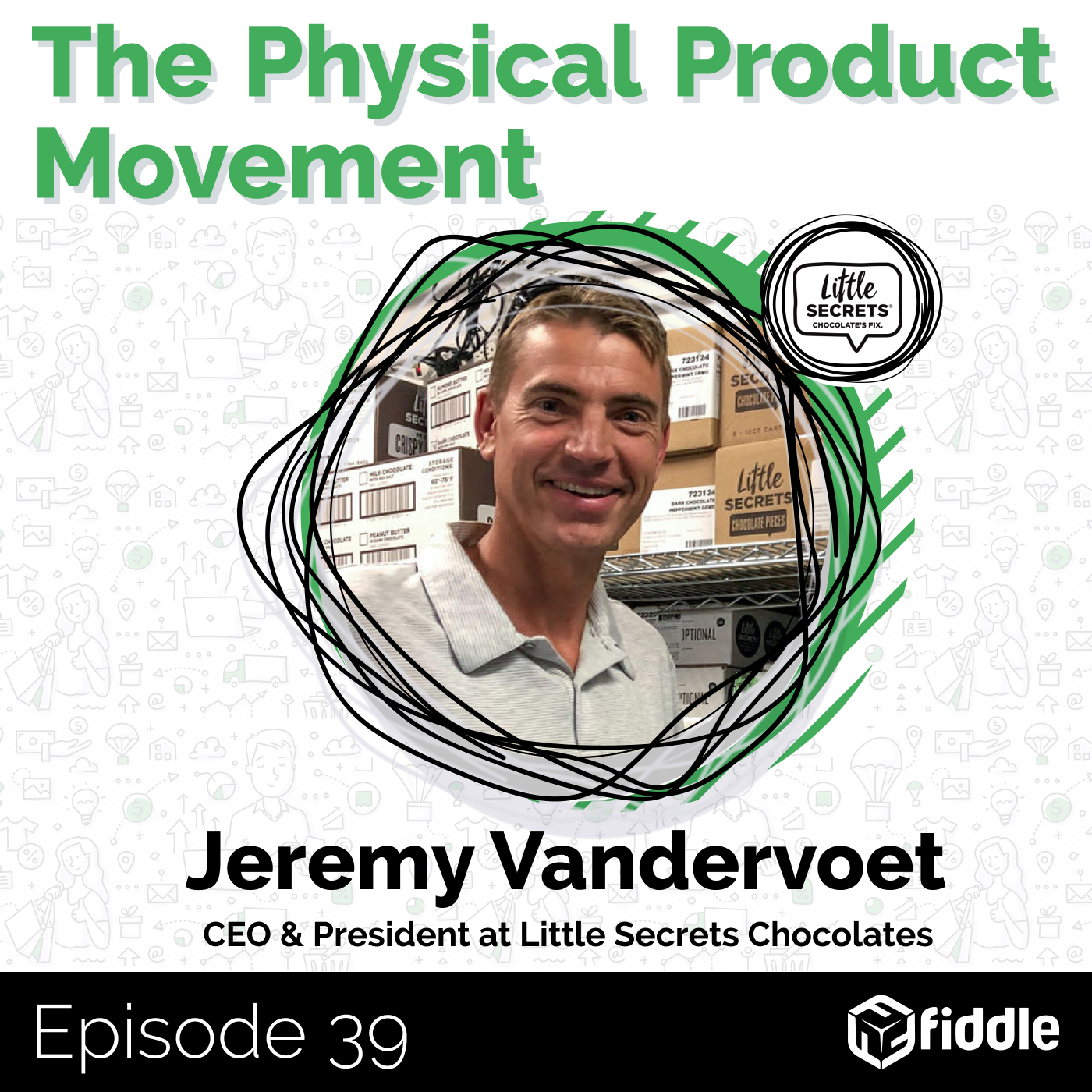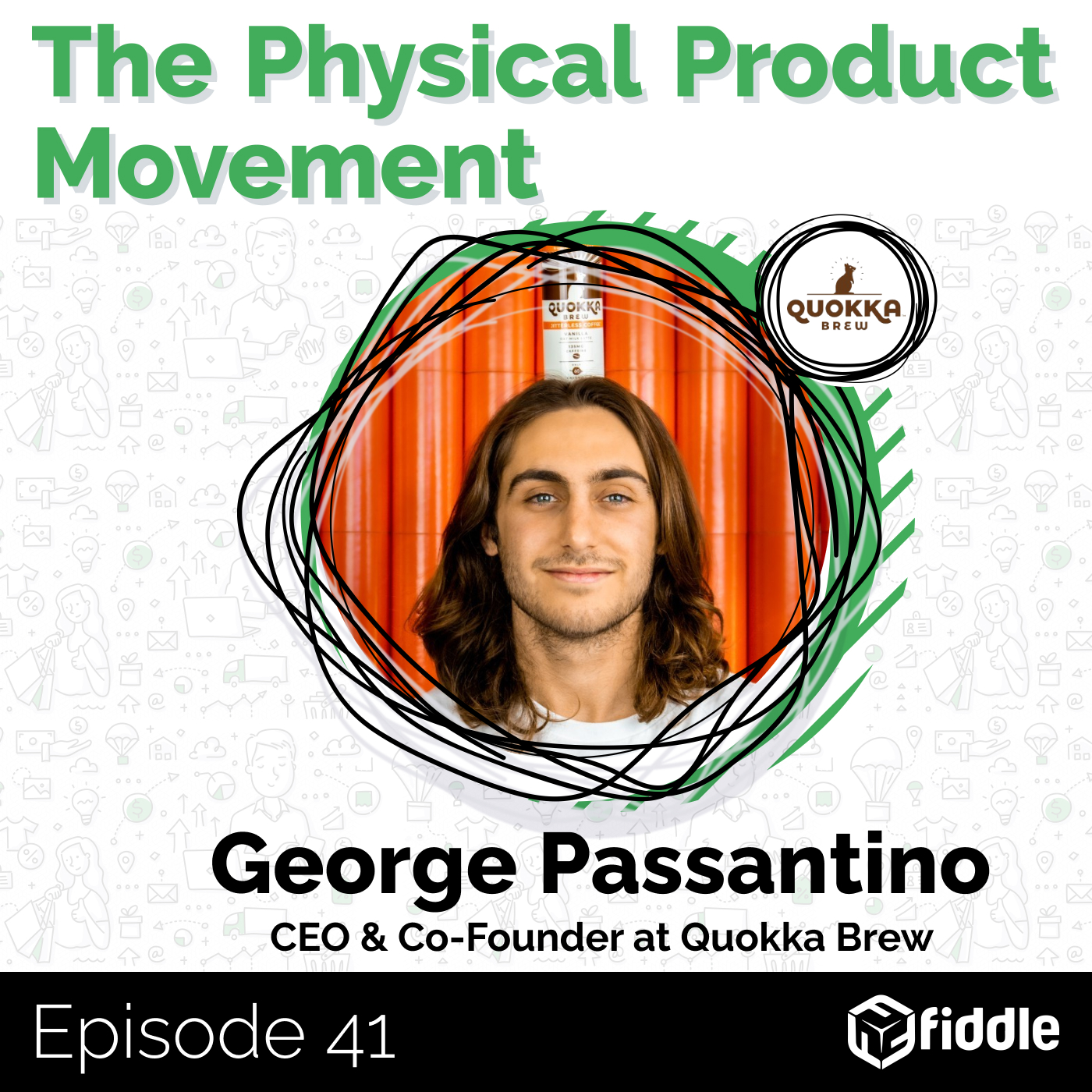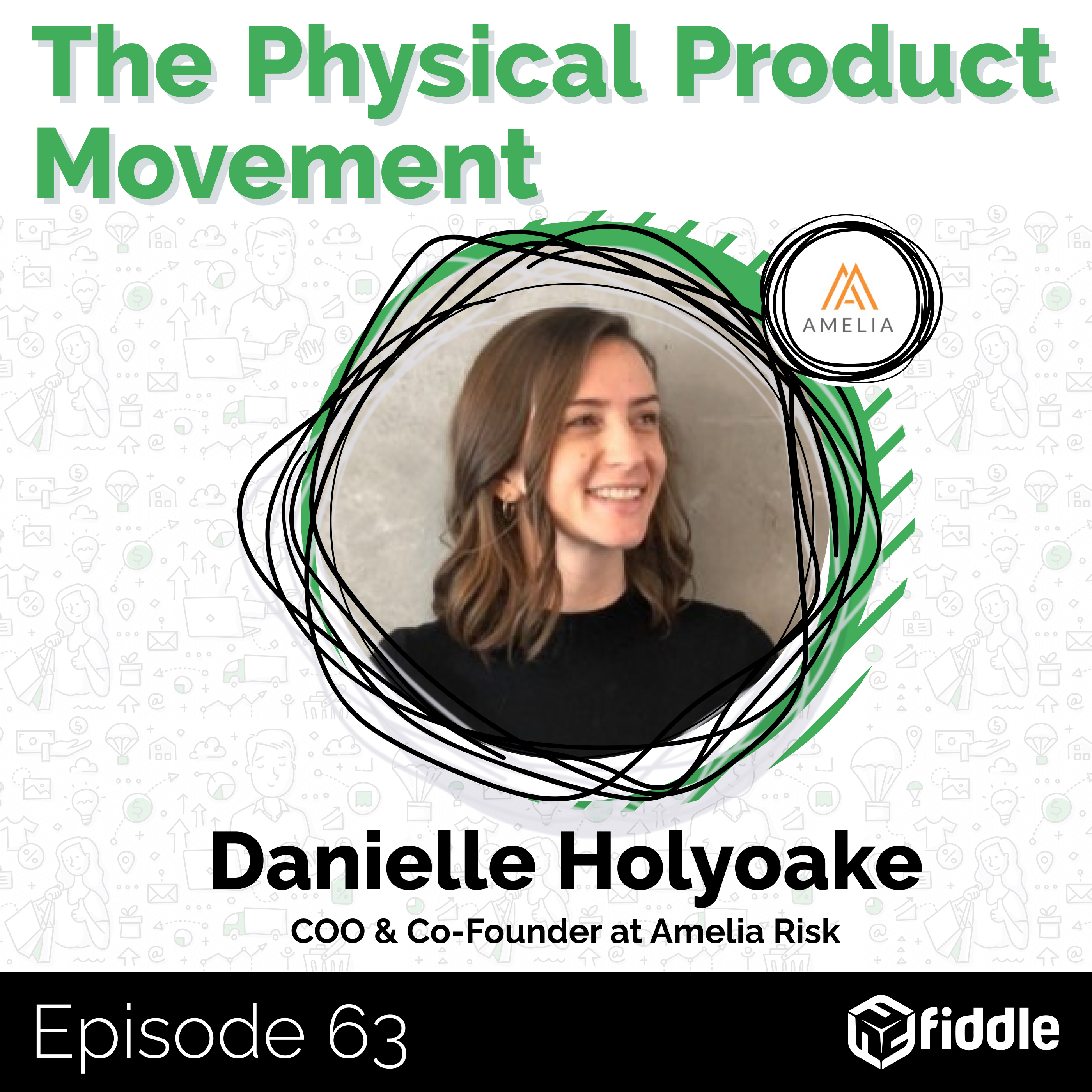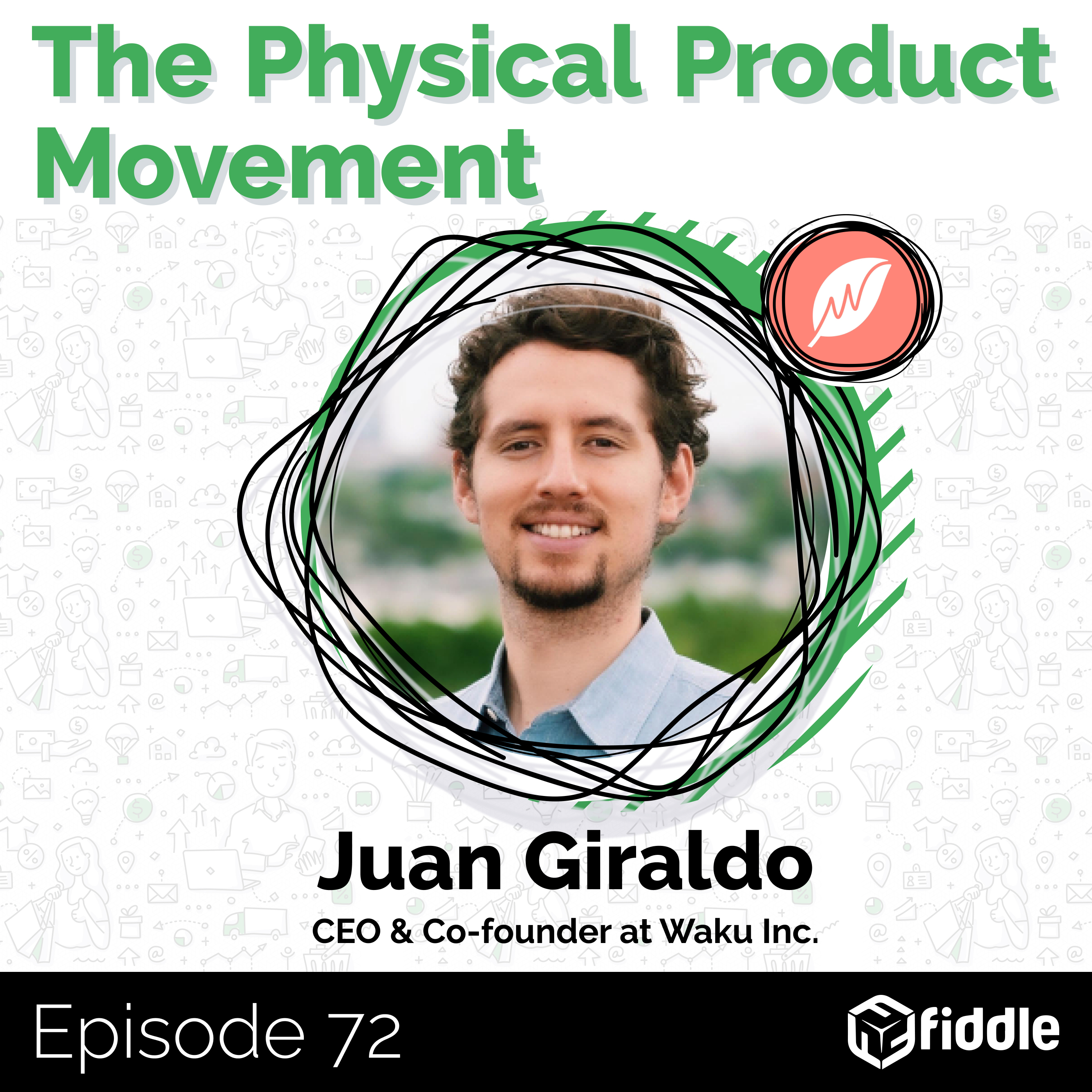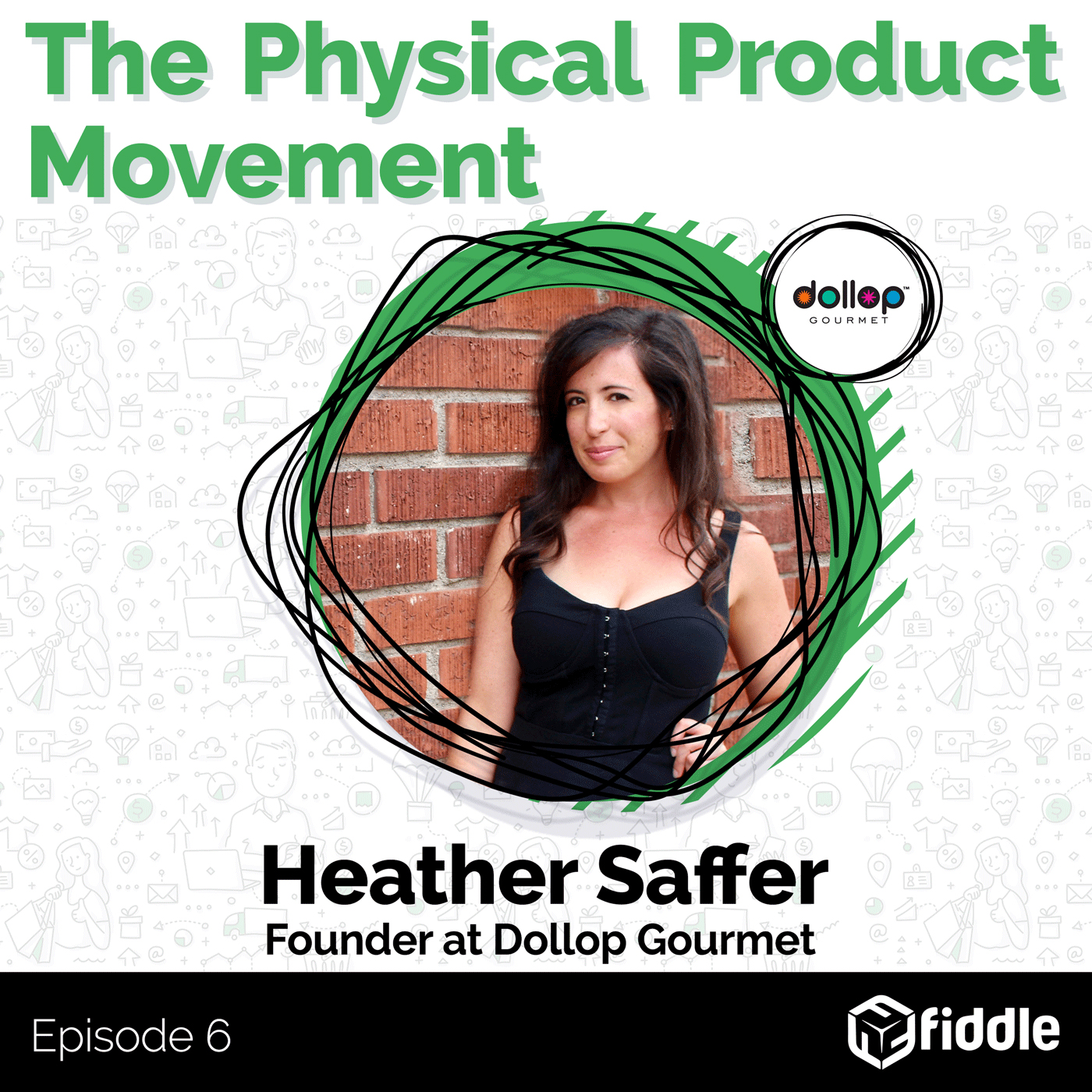In this episode, we’re joined by Juan Salinas, Founder & CEO of P-nuff Crunch, a Mark Cuban Company; made from protein-filled Peanuts, fiber-full Navy Beans, and energy-lasting Rice baked into a crunchy, powerful puff snack.
In this hot seat session with Andy Burningham, Juan tells us about his hardest-won lessons in the initial stage of developing and launching his product.
He also shares important insights: for example… why you should bring on help as soon as you can for marketing, sales, and other business functions.
And most importantly, he spills the beans on the benefits of selling online and how it leads to faster and quicker feedback directly from your customers and how getting into retail is more expensive than you think.
Listen on Apple Podcasts here or Spotify here.
Transcript
Ken Ojuka: Welcome to the Physical Product Movement, a podcast by Fiddle, we share stories of the world’s most ambitious and exciting physical product brands to help you capitalize on the monumental change in how, why and where consumers buy. I’m your host, Ken Ojuka.
Taylor Howe: What can you learn from a PhD food scientist turned CPG founder, who did a deal with Mark Cuban on Shark Tank. We learned from the man himself, Juan Salinas of P-nuff Crunch, and that’s who we interviewed on today’s episode of the Physical Product Movement. It’s an interview between Andy Burningham, who is our Sales Director of Fiddle.
Taylor Howe: And Juan, during the interview, you’ll learn about his hardest lessons. Why you should bring on help as soon as you can for marketing sales and other business functions. The benefits of starting online and not in retail stores and how it leads to faster feedback directly from your customers and how getting into retail is more expensive than you think. We hope you enjoy the interview.
Andy Burningham: Welcome everyone. And thank you for joining. My name is Andy Burningham and I am with Fiddle Inventory Management Software. And I have the pleasure today to be able to speak with a colleague, a friend, and a true professional who has had a wealth of experience over 20 years of experience with the snack food industry.
Andy Burningham: Please help me welcome the Founder and CEO of P-nuff Crunch, Juan Salinas, Juan, how are you doing?
] Juan Salinas: Hi Andy, how are you? Thank you for the invite to your podcast.
Andy Burningham: Yeah, no, I appreciate you jumping on with me. And I know Juan that, you know, we were talking right before we started this and it’s been, you know, there have definitely been some ups and downs. It sounds like in, in your path and where you become as a brand now. And I know that there’s a lot that those who are listening to this broadcast can come to learn from you. Maybe some things that maybe some missteps, but also some successes. I’m going to put you in the hot seat and we’re going to ask you some of those questions to help those CPG brands who are young, smaller size, but they’re trying to grow, trying to get to market.
Andy Burningham: So my first question to you, Juan, is, you know, what are some of those hard lessons that you have learned? Where maybe it was a misstep or something that you’ve taken to heart.
Juan Salinas: Sure. I can share a couple of experiences that might be helpful. And one event you’re very familiar with cause I think, you know, when you first started your company, you have to have your product made basically has to be available so that when you sell it and they place an order for you, you’ve got to have a physical product that you’re selling, unless you’re selling a service, you know, in which case, you know, you’ve got to also have whatever service you have ready to be, given to the customer.
Juan Salinas: In my case, I make. And a snack has to be manufactured by machines to do that. So the first step was for me to try to find a manufacturer that will make my product, and I have a very unique formula and product. So it wasn’t easy from the beginning to find someone that will be able to make it.
Juan Salinas: But, you know, there’s the lessons learned is like, find that manufacturer to make sure that you’re happy with them. You have a contract with. Specifically states where they’re supposed to do for you and you stayed exactly what quality measurements also, you want them to. Because quality is everything, you know, once the consumer receives it, you’re basically being judged on the quality of your product.
Juan Salinas: My experience was that I had very bad luck maybe, or just lack of experience. And I started with, you know, a couple of manufacturers, I did not have contracts with, it was more word of mouth and I, and they ended up basically dumping me. He runs for different reasons in my case because I had an allergy to one of my ingredients and they thought it could handle it.
Juan Salinas: But at the end they couldn’t, it was easy for them just to tell me, okay, you know, sorry, but we, you can’t make, we can’t make your stuff here. I had a country. I might’ve been able to have a little more power from my aunt to say, okay, you know what? The contract gave me six months to try to find another place, or renegotiate somehow so that I can continue to supply my product to the customer, but that was not the case.
Juan Salinas: So that was a very hard lesson for me to learn. And it’s something that, you know, at the very beginning, make sure of that. You know, whatever, however you make your product. It’s, you know, you’re well set. Are you ready to go? Because once your sales start coming in, you can’t stop and you don’t want to tell anybody that you don’t have.
Andy Burningham: Right.
Juan Salinas: Your credibility goes down the drain and they figure it out. This guy doesn’t know what he’s doing. I pass
Juan Salinas: this one on the other one, I would say, you know, in terms of sales and marketing, right? Those are the two things that you need anymore. Really growing your brand is what’s gonna get the name of your product out there that just saw Harley, you know, sweat all the time that you created this idea. Now you have a product, now you have to put it in front of buyers.
Juan Salinas: And I always thought that. Good enough just for me to do it. That’s like, I know a little bit of sales, you know, I can do it around social media. And in fact, it’s a good beginning. You can start doing some of that on your own at the beginning, but then it will become very overwhelming. Very fast. When, you know, you’re into a few stores and they’re started calling you about whatever issues support, you have to go into the stores, you know, and make sure that the product is well merchandise on the shelves that is looking good, that they had the inventory follow-ups this gets really busy, really quick.
Juan Salinas: And so, you know, my takeaway from that is like, I lost a lot of potential business because I couldn’t handle it on my own. And I thought I could. And I wasn’t, I realized I wasn’t the best sales man either. I let them know, you know, I think, you know, what I have now is a small team. It’s still a very small team, a sales team, someone that actually doesn’t hire.
Juan Salinas: Cause I don’t still don’t have, you know, all that money to be able to hire a VP of Sales, but I could do a contract with an external VP of Sales. You know, this is someone that maybe has five or six brands that he’s managing and he’s acting as your VP of Sales, but he’s not on your payroll. Instead you pay him a monthly fee, like a contractor and the same with marketing, you know, but it’s very time consuming to do all the social media and to do, you know, answer every text, ,every comment or DMs.
Juan Salinas: You know, you want to bring somebody in that can help you with that stuff while you concentrate on some of the bigger challenges we have.
Andy Burningham: I think that’s, you know, that’s an excellent one because a lot of these brands, right? As they’re entrepreneurs, they’re dreamers, they’re visionaries. They want to be the trailblazer.
Andy Burningham: And in that same mindset, sometimes we do get caught up, right? Like we can do everything we’ve gotten this far. Let’s just keep going. And, you] know, we have limited resources. So, this is something we’re just going to take on, but I love that a point that you make that, you know, we have to be able to accept that, you know, there’s maybe better things that we can focus on with our time and we can outsource some of these other facets of the business to be successful.
Andy Burningham: Right. So that’s an excellent point. I appreciate that. And you know, Juan I have to back up, there’s something, you know, behind you there. And I would love for you to talk about. You know, before I ask you the next question, can you tell the audience a little bit about P-nuff Crunch and like, what do you guys even do? You know? What are you all about?
Juan Salinas: Yeah, so, well, the background behind P-nuff Crunch, as you mentioned earlier, and you have about 20 plus years of experience, Working in the snack industry. I used to work for some of the largest CPG food companies in the world. You know, based here in the United States.
Juan Salinas: What I used to do, I used to create new products for them. And then I will develop into actual physical products that we will launch. So I sort of created a little of a, you know, a little bit of an, a specialization on creating innovative products. One of the things that always bothered me is that, you know, we always created products to make products stay really good.
Juan Salinas: And by far that’s the most important thing. Even today it’s got to taste good. Otherwise people will not come back and buy. Well, my problem that I had is that a lot of the surprises that we were creating didn’t have any real good nutrition behind it. It was just tasting good, but, you know, it was just full of chemicals and, you know, fat and sugar, et cetera.
Juan Salinas: So, stuff that I couldn’t even eat myself, you know, I like to be very active and observing it actually a bodybuilder, a professional at some point in my life, not too long ago, I still practice a lot of working out and they do, some enduring races still, but, I always was looking for. You know, food and snacks that I could have that will actually help me with the performance and all these sports.
Juan Salinas: And I couldn’t find anything, you know, so that gave me the idea to create this product which is P-nuff Crunch, which is a, it’s a puff, an extruded puff that is made from navy beans, brown rice and peanuts. And when you combine all these three ingredients, it provides what we call a complete protein profile.
Juan Salinas: Which is a plant-based protein but it has all the elements. All the amino acids are necessary to build muscle and to recover muscle from the exercise. So that’s why we’re so different from any other snack, even other so-called healthy snacks. You know, in addition to that. You know, I have done a lot of research with some of these companies that I used to work with about some of the needs of the athletes in terms of energy.
Juan Salinas: So we know carbohydrates provide energy to the athlete, but not every carbohydrate is made the same. So, what I wanted to do is create a product that had the right set of carbohydrates to give you the energy, but not to, you know, elevate your insulin or which eventually create fat and all that. So, a couple of the elements that my product has is called P-nuff Crunch.
Juan Salinas: These delicious based, like, you know, peanut in peanut butter,
Juan Salinas: We have three flavors. You know, you can buy it easily on our website at https://www.pnuff.com/.
Andy Burningham: Perfect. Awesome. Well, thank you for that. I should have started out that way, but hey, appreciate it. We’ve given a little intro, a little background about your company. So let’s kind of jump back in with another question here. So if, if I’m a young brand and I’m trying to get to market, but I’m struggling because again, I lack some resources, you know, budgets financially, strapped, what are some suggestions you would give to somebody who needs to try to get to market and do so successfully?
Juan Salinas: Yeah, you know, I wish I knew this when I first started, because I think I went about it the wrong way. No, I don’t think there’s a wrong way.
Juan Salinas: There’s probably always a better way. I wish I would have started on the online and let me explain this because the way I started is the traditional way. You know, I ran, you know, two retail stores around my area and I just walked in and tried to sell my product to all these big chains, supermarkets. most of the reaction that I was getting is like, okay, you know, who are you?
Juan Salinas: Show me some data. Like, where are you being sold? You know, how much money are you making ? What’s the turnover with your product? I don’t know the store, honestly, well, you were the first store. I don’t have any data. And they’re like, ah, man, you know, coming back when you have something, you know, that’s pretty much, it’s sort of like the chicken and the egg, you know, cause it’s like, they want to know that they’re going to put a product into their shelves that is going to sell. And for that they need. But in order for me to build the data, I need some of these people that say, okay, bring it in. Online, it’s different, you know, online, you have your own space that you could just get in.
Juan Salinas: You know, you’re getting, you’re getting to the Amazon. You can have your own website, you could create all the marketing and beautify it the way you want it. And you can target the people that you want to target specifically, you know? And there are tools to do that, which, you know, we won’t go into this, but as for social media through, you know, different email, email campaigns.
Juan Salinas: You can actually start to target that group that you feel is the right target for you. And the niche that you feel is the right niche for you. You know, it’s the people that are active, was it their kids? I, their moms, actually help you develop a little bit of strategy to understand your consumer better.
Juan Salinas: So if you thought that, you know what this product is going to be great for athletes, and I’m starting to target athletes and it’s time to see like, you know what these guys did, they’re not getting it. You know, maybe they feel the protein level is too low. Maybe it’s just too dry for them or too wet for them, you know, like, but I’m seeing these other groups of vegans really enjoying this stuff.
Juan Salinas: And really, you know, basically with us, it’s like maybe my niche is the hardcore athlete, maybe my niche is the vegan, you know? And so this is just an example. This is not what happened with that example that, you know, it helps you understand better who you target is so that when you go out there to a retail store, you have more data that you build from the online business and you can say.
Juan Salinas: I have data that shows that, you know, these products were like, but this type of people, millennials, and, you know, they’re going to be looking to buy this product instead of these other products. And so you have a very interesting story. A very story to tell the buyer at a retail store with some numbers behind it.
Juan Salinas: And then that will make him a little more comfortable to bring him to the store. So it’s more economical as well. Getting into shelves in the stores is very expensive. And you have to keep going back to the stores, making sure that the inventory is there and making sure that the product is looking good on the shelf that all takes a lot of time and resources that you don’t have to spend when you’re selling online
Andy Burningham: Yeah, no, that’s, that’s perfect. And I, and yeah, definitely the, with, with the unfortunate, you know, COVID situation, but it really has pushed us forward in terms of e-commerce and social platforms. Right. So I love that point because really that is something that we need to embrace if we haven’t already, in terms of our sales channels.
Andy Burningham: And to your point, if you’re young, You have limited resources. I mean, what a great way to start and to really kind of pivot and fit that demographic. What’s the group that’s going to gravitate to your product, to your brand? Right? So that’s a great insight and it kind of segues into, my final question for you is.
Andy Burningham: With brands that are trying to scale. So they’re at market and they’re small, but they’re trying to scale. They’re trying to get maybe into more e-commerce places or into retail, brick and mortar or distributors. Okay. Any other tips or thoughts, advice to be able to then scale up your brand?
Juan Salinas: Yeah, I mean, something that worked for me, it’s, I don’t know, it will work for every brand, but, I will, I will always tell people on a new brand, it’s like, don’t be afraid of, you know, international markets.
Juan Salinas: So, and I’ll tell you a story because, two years ago, our biggest sales, numbers and growth was over in the middle east with minimal effort which completely surprised me. You know, I was like, Somebody from the middle east say, Hey, I think you’d probably be great to be sold over there. We are an export company.
Juan Salinas: We’ll take your product. And we’ll basically partner with the distributor over there and have it distributed to the middle east. I said, that’s easy enough if he fails, no big deal. I’m here in the us. This is my main market, whatever. And do you know that we get orders and truckloads from the Middle East, our product, because they love, there’s a lot of the stuff over there and we don’t invest much money into anything into marketing.
Juan Salinas: We don’t invest into, you know, sales or anything it’s just part of, it’s already kind of building and the price that we give them and they just go on and they know what to do in those countries, you know, much better than what I will know what to do. We’ll say don’t be afraid of, you know, those international markets.
Juan Salinas: A lot of these countries really look up to products that are made in theUSA. So, you know, having that label on your product is very important. You know, I have the little flag of the United States Made in the USA. It’s huge. It should definitely be part of your packaging design and, you know, try to promote that to be able to sell them internationally.
Juan Salinas: And you could do that through different ratios. There’s a lot of food ratios in my case where you can go and meet buyers from international markets who are coming here to the US, specifically looking for things that are innovative, you know, made in the USA. So that’s one way of expanding any channels.
Andy Burningham: That’s perfect. And I, you know, kind of going back to the last point, right? Like in the world that we’re living in, right. Where it’s so much easier to be able to cross those channels, to be able to go international. And I just never considered that. That’s true. I could see maybe there’s some hesitancy there for some young CPG brands to go international.
Andy Burningham: You know, this is where we are. We make it in the U S but you know, those could be great opportunities for them. So that’s an excellent point. So listen, Juan, it has been so good to talk with you today. I appreciate your advice and insights. Again, with over 20 years of experience that you bring to the table and, you know, it’s never easy for any of us, right?
Andy Burningham: There’s been ups and downs in your journey, but, you know, to where you are today and seeing the success that you’re having. And I didn’t even mention you were on Shark Tank with Mark Cuban and all that, you know, the success that you have had over time shows your resilience and your grit. And that’s really what it’s all about for these young brands.
Andy Burningham: It’s being persistent, being innovative. And being that trailblazer. So, I appreciate you being with me today. Great talking with you. And, I appreciate all of you watching today and again, check out P-nuff Crunch, and check out the awesome product that they’re making there. Also check out Fiddle Inventory Management Software.
Andy Burningham: If you have any needs to better manage your inventory, track it and have insight. Yeah, check us out @fiddle.io until next time. Thanks everyone!
Ken Ojuka: Physical Product Movement podcast is brought to you by Fiddle to find out more about Fiddle and how our industry leading inventory ops platform is giving modern brands and manufacturers all visibility into their inventory and operations.
Ken Ojuka: Visit fiddle.io, and then make sure to search for Physical Product Movement in Apple Podcasts, Spotify, Google Podcasts, or anywhere else, podcasts are found. Make sure to click Subscribe so you don’t miss any future episodes on behalf of the team here at Fiddle. Thanks for listening.

